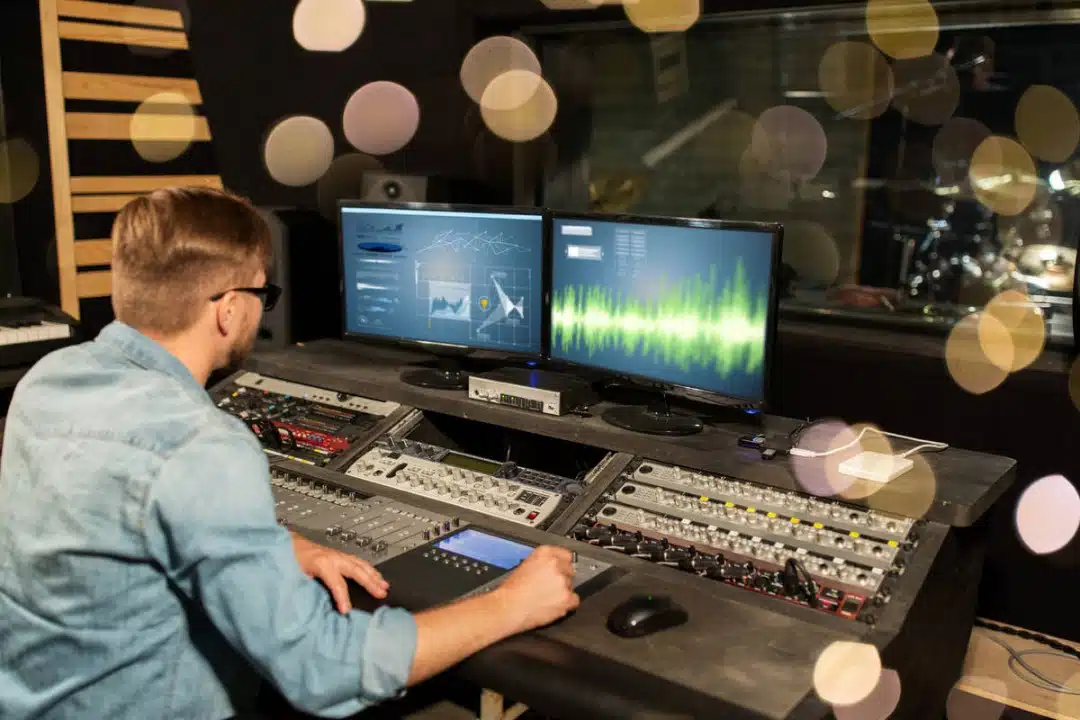Are you ready to make music? Learning music production can be a long, but rewarding journey. But with the right strategy and guidance, you’ll be able to master all of the techniques necessary to create amazing tracks. In this blog, we’ll provide step-by-step guidance on how to learn music production quickly and efficiently. Get ready to rock, roll and produce some great tunes!
Introduction to Music Production
Music production is a creative and demanding process. As an aspiring music producer, you’ll need to be familiar with the latest technology and trends in the music industry, understand complex audio engineering principles, possess imaginative compositional ideas, and be capable of managing different stages of the production process. Producing music requires blending both creativity and technological knowledge.
To make this happen, you need to understand the basics of music production such as understanding different types of audio equipment, learning how to use recording software (DAW), understanding comping and arrangement techniques, mastering different effects plugins like EQ or compressor, etc. It takes time to grasp all these concepts—the amount depends on the complexity or simplicity of the project—this is why it’s important to develop a well-structured approach where specific goals can be tracked on a regular basis.
Professionals in the music industry recommend taking lessons from specialized courses or simply reading comprehensive books that provide easy-to-follow guidelines for creating your own sound. Experienced producers advocate for learning from one track at a time so that users don’t feel overwhelmed when coming up with their own songs. Music producers also suggest creating code libraries in which essential project management items can be gathered together for easy reference material saving both time and money.
In many aspects, music production is more about discipline than it is about talent; Nevertheless learning how to sequence tracks properly is not enough especially if you want to grow as a musician in this ever-changing musical landscape. Knowing when to apply certain techniques in order to improve musical texture or times has been proven very useful when working with previously created material as well as developing new themes or sounds that will aid your songs compositionally and aesthetically speaking.
 Understanding Basic Music Theory
Understanding Basic Music Theory
A strong foundation in music theory is essential for any aspiring music producer. Music theory covers the fundamentals of music composition, and it includes terms like rhythm, scales, intervals, chords, and dynamics. By understanding the underlying principles of musical structure, producers can create more effective musical ideas and explore new compositional approaches. Common topics include reading sheet music, chord progressions, harmonies, and basic music notation.
Understanding basic music theory is also critical for mastering software such as DAWs (Digital Audio Workstations) which are used for making professional recordings. With a deeper understanding of the fundamentals of music production, you’ll be better equipped to understand how different aspects of sound interact with each other and create compelling sonic textures. Additionally, you’ll also gain valuable insight into how different genres or styles use these principles in their production techniques.
Acquiring Necessary Equipment
When getting started with music production, it is important to have the right equipment. A basic laptop, a midi controller, and audio interfaces are often enough to start producing basic tracks. Other equipment may be necessary as well to create a complete track that meets professional quality standards.
Midi Controllers: Typically found in the form of keyboards and drum pads, midi controllers provide a hands-on way of producing music. Most include knobs and faders as well as assignable buttons which makes them useful for controlling virtual instruments, recording automation, etc. Audio Interfaces: Audio interfaces are necessary for recording an audio signal from a microphone or instrument, or sending an audio signal to speakers or monitors for playback. They also provide connectivity for external processing devices like effect processors such as EQ or compressors using line-level input/outputs.
Computer & Software: Though not strictly necessary some producers prefer a dedicated computer that can handle high-end DAWs (Digital Audio Workstations). Many DAWs are available on both Apple and Windows devices; however if budget allows it is recommended that producers invest in an Apple computer because most top-tier plugins tend to run best on Apple systems. Additionally, many professionals recommend investing in plugins rather than stock presets when building up your setup because they offer sound more customizability and sound better overall.
Developing Your Ear for Music
Developing your ear for music is an essential element of learning how to produce quality audio. It takes time, practice and experience to fully understand the impact sound can have on a track and to effectively manipulate it. Developing your ear is an important part of being able to identify problems in audio, separate individual components, and know where sounds should exist in a mix. Start by listening carefully to the music you listen to every day. Pay attention not just to its melody but also listen for the subtle variations in tone, texture, and overall sonic dynamics — this will help you develop an understanding of what makes up a good song or production track.
Begin by playing with frequency operations that alter the character or feel of sounds such as equalization or modulation effects –doing so will teach you how individual changes can affect the sound as a whole. Understanding how alterations like these work together in complex ways will be instrumental in helping you create great mixes down the line. Continue training your ears by using mixing techniques like panning, reverb, and EQing on familiar pieces of music before tackling more complex mixing techniques such as multi-band compression or side-chain compression. Taking time at each step will build upon your foundational knowledge while honing your skill set until you are producing stellar results every time!
Exploring Music Production Software
Music production is a highly creative and technical experience. While the fundamentals of music remain the same, the tools and technology used to create and record have changed drastically over time. Investing in exploring various software platforms and tools is an essential part of learning how to produce music and create amazing-sounding recordings. One of the most popular tools amongst music producers is a Digital Audio Workstation (DAW). A DAW is a user-friendly piece of software that allows the user to record, sequence, produce, manipulate and mix sounds into an entire song or composition.
Many professional studios will use high-end DAWs such as ProTools or Logic Pro, but novice users who are just starting out can find great success with free or low-cost DAWs such as GarageBand or Audacity. Finding the right DAW for you will take some trial and error as all pieces of production software will be slightly different in their features and available sounds. As a novice producer, it’s often best to start with something simpler such as FL Studio or Ableton which offer helpful tutorials for beginners and are known for their intuitive interfaces.
Once comfortable with your chosen platform there are many additional sound libraries that can be purchased online which offer an expanded array of musical instruments, effects, and genres to choose from. No matter which music production software you choose, take time to explore all areas as well as tap into forums, videos, and tutorials online with informative step-by-step instructions that may come in handy during your creative journey!
Creating Your Own Music
Creating your own music is one of the most rewarding aspects of learning music production. The possibilities are endless and you’re able to express yourself creatively in ways that were once impossible for aspiring musicians. If you’re just starting out, here are a few tips:
1. Learn the basics. You’ll want to familiarize yourself with the core concepts in music such as chords, scales, intervals, rhythm, and song structure. This foundation will help you create your own unique sound and start to produce your own tracks.
2. Develop a workflow that works for you: You can use hardware or software instruments, drum machines, and samplers depending on what type of musical style you want to create. Depending on what technology you have access to, experiment with different tools until you find the ones that work best for creating your desired soundscapes.
3. Practice: Rewarding creative results usually don’t come quickly; try exploring new genres or sounds that may push your boundaries as a producer, practice frequently even if it’s making quick songs or creating beats — this will help build up skillsets quickly.
4 Get feedback: Collaborate with other producers or ask friends and family what they think of your music; this will give you an outside perspective before sending anything off for mastering or mixing.
Learning from Other Producers
Learning from other producers is an important part of music production. Many producers are self-taught, relying on research and experimentation to create their sounds. Other producers, however, can provide essential tips and tricks that help you to better understand the music production process.
One great way to learn about music production from other producers is to attend seminars and workshops specifically designed for this purpose. Attending these events helps you gain insight into how producers make their beats, as well as understand key terms and processes that help move your own mixes forward.
Many times the guest speakers are professional musicians or mixers/producers who share their stories on how they achieved success in their careers. Another great way to learn from fellow producers is through networking websites such as Soundcloud or Reddit’s /r/WeAreTheMusicMakers—places where you can share your own work and get constructive feedback from experienced professionals in the industry. For example, if you post samples of a current project online, many experienced members can share advice that could help you improve the mix.
Doing research online also introduces you to tools and techniques used by more experienced engineers which will increase your knowledge base significantly. Being part of a larger producer community also helps build relationships with fellow musicians and peers with whom you can collaborate on future projects or get advice on handling problems related to your producer workflow. By actively engaging with members of the community you gain access to challenges that come up when producing music so you can use those challenges towards being a better musician in general – learning alongside like-minded individuals takes your career progression further!
Finalizing Your Music
The last step in the music production process is the finalization of your music. This includes both mastering and remixing. Mastering involves adjusting the overall levels of all songs on an album, creating a consistent sound throughout. In addition, mastering can include any number of modifications such as equalization and spatial effects to add various nuances to your work. Remixing is an art in its own right as it involves taking multiple tracks from an original composition and rearranging them into a new perspective. This can be done for creative or technical purposes, or just for fun!
A great way to learn to remix is by experimenting with existing loops and samples that come with the Recording Software you use for music production or mixing audio recordings together. Finally, exporting your composition is essential before sharing it online, whether doing over-the-air radio or releasing a track via social media platforms like Soundcloud. Exporting audio files as practice will help you become more comfortable with this process so you can effectively share your work and get it heard!



 Understanding Basic Music Theory
Understanding Basic Music Theory






































